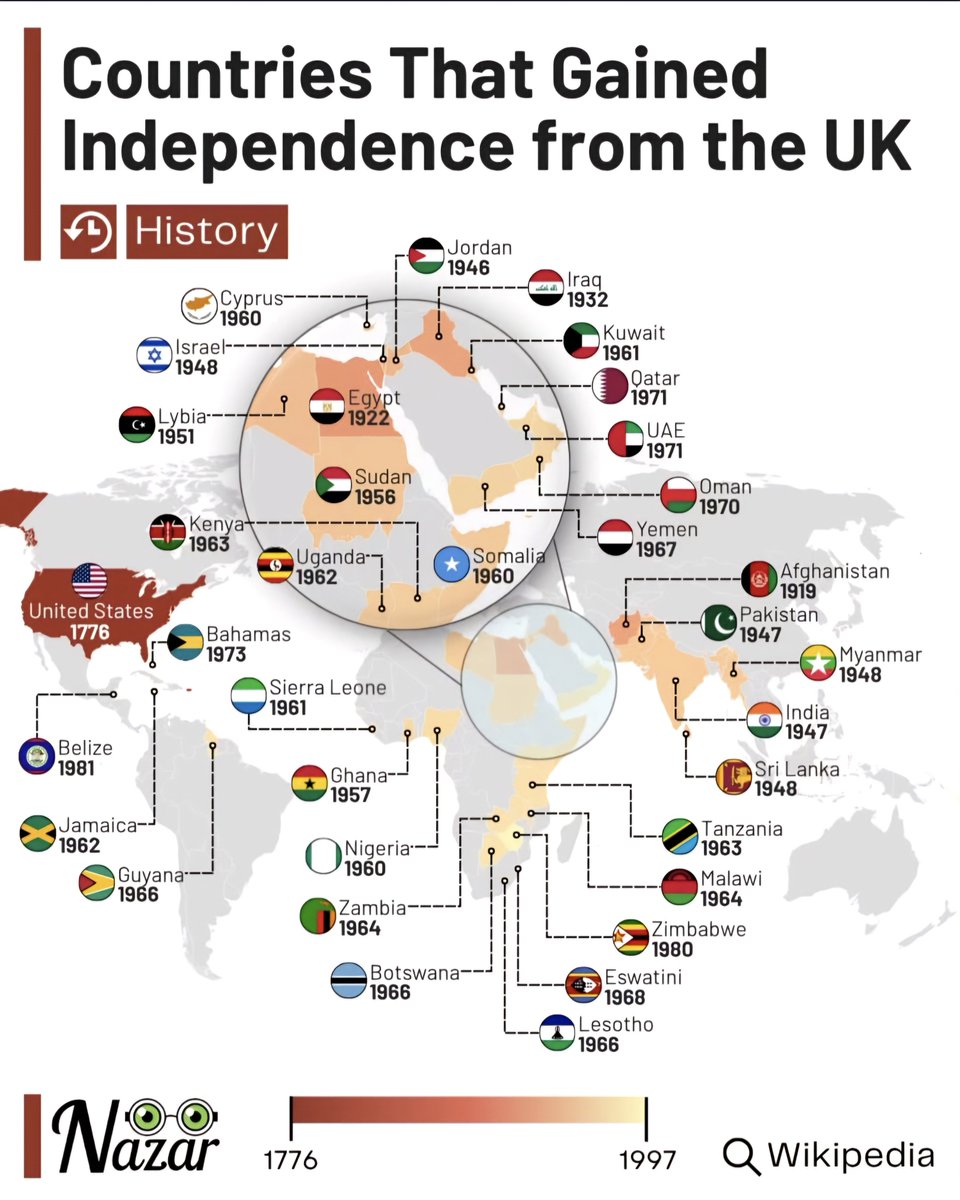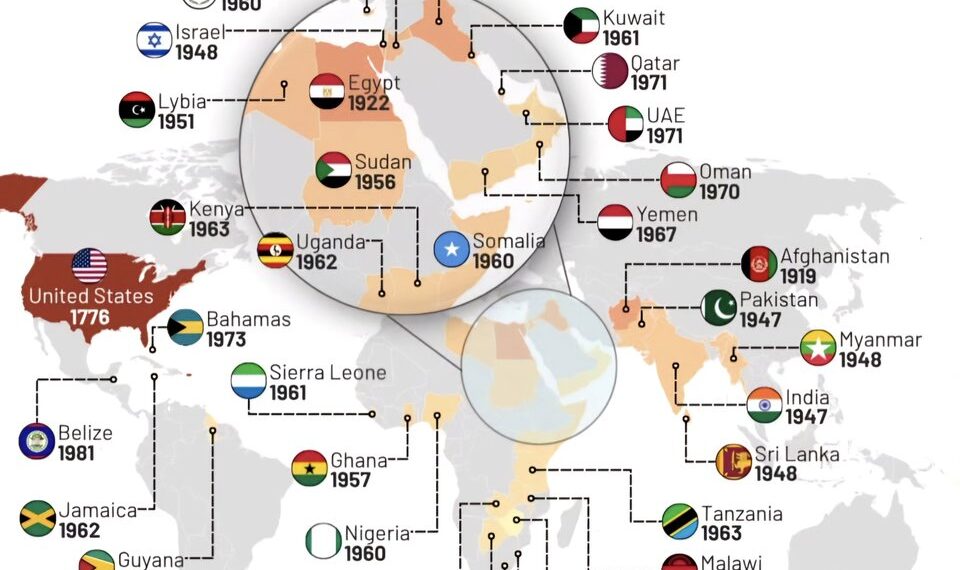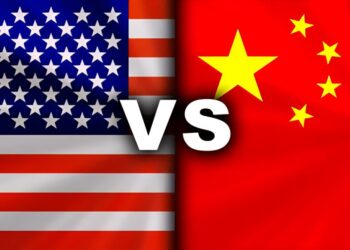Select Language:

As we look through the lens of history, the quest for independence has shaped the global landscape. Many nations have emerged from the shadows of colonial rule, particularly from the British Empire. Below is a list of 35 countries that gained their independence from the United Kingdom, marking significant milestones in their history.
United States, 1776
The United States was the first colony to break away from British rule, declaring its independence on July 4, 1776. This landmark event set the stage for the creation of a nation founded on principles of liberty and democracy.
Afghanistan, 1919
Following years of British interference, Afghanistan secured its independence with the signing of the Treaty of Rawalpindi in 1919, marking its emergence as a sovereign nation.
Egypt, 1922
Egypt was granted nominal independence in 1922 after years of British protectorate status. The revolution in 1952 ultimately led to the complete abolition of the monarchy.
Iraq, 1932
Iraq became formally independent on October 3, 1932, following a period of occupation and administrative control by British forces since World War I.
Jordan, 1946
Transjordan, now Jordan, declared independence from British mandate in 1946. The nation has since developed a stable monarchy and remains a key player in Middle Eastern politics.
Pakistan, 1947
On August 14, 1947, Pakistan gained independence, along with neighboring India. The partition marked a significant historical moment, leading to mass migrations and conflict.
India, 1947
India’s independence on August 15, 1947, is one of the most notable events in the 20th century, led by figures such as Mahatma Gandhi and Jawaharlal Nehru.
Israel, 1948
The State of Israel declared independence on May 14, 1948, following the end of the British Mandate and the UN’s partition plan, marking a crucial change in the region’s geopolitical landscape.
Myanmar, 1948
Formerly known as Burma, Myanmar gained independence from Britain on January 4, 1948. The post-independence era has been marked by significant political turbulence.
Sri Lanka, 1948
Ceylon, now Sri Lanka, obtained independence on February 4, 1948. The island nation has since navigated its own path through challenges and opportunities.
Libya, 1951
Libya became the first African nation to gain independence from colonial rule on December 24, 1951, leading to the establishment of a constitutional monarchy.
Sudan, 1956
Sudan gained independence from British-Egyptian administration on January 1, 1956, becoming the first African country south of the Sahara to achieve this milestone.
Ghana, 1957
As the first sub-Saharan African country to gain independence on March 6, 1957, Ghana’s liberation inspired other nations across the continent.
Cyprus, 1960
Cyprus achieved independence on August 16, 1960, following a guerilla campaign against British rule. This has led to a complex political situation on the island that persists today.
Nigeria, 1960
Gaining independence on October 1, 1960, Nigeria has since emerged as the most populous country in Africa, facing various socio-political challenges.
Somalia, 1960
Both British Somaliland and Italian Somaliland united to form the independent nation of Somalia on July 1, 1960. The country’s stability has been an ongoing challenge since then.
Sierra Leone, 1961
Sierra Leone’s independence on April 27, 1961, marked a new chapter in its history, though the nation faced civil conflict years later.
Kuwait, 1961
Kuwait’s independence from Britain on June 19, 1961, laid the foundation for its emergence as a key player in global oil markets.
Uganda, 1962
Uganda’s independence was achieved on October 9, 1962, following a long struggle for liberation, leading to both cultural and political evolution.
Jamaica, 1962
Jamaica gained independence on August 6, 1962, as part of the trend of decolonization across the Caribbean region.
Kenya, 1963
Kenya achieved independence on December 12, 1963, following a difficult struggle for freedom marked by the Mau Mau Uprising.
Tanzania, 1963
Tanzania became independent on December 9, 1963, emerging from the amalgamation of several territories previously colonized by various European powers.
Malawi, 1964
Finally free on July 6, 1964, Malawi’s transition was significantly influenced by its anti-colonial struggle.
Zambia, 1964
Zambia also gained independence in 1964, becoming a focal point for anti-colonial movements in southern Africa.
Botswana, 1966
Known for its stable governance, Botswana gained independence on September 30, 1966, with a strong focus on democratic principles.
Lesotho, 1966
Lesotho celebrated independence on October 4, 1966, maintaining its status as an independent country surrounded by South Africa.
Guyana, 1966
Guyana secured independence on May 26, 1966, shaping its national identity in the post-colonial Caribbean.
Yemen, 1967
South Yemen gained independence on November 30, 1967, becoming a significant player in the Cold War dynamics in the region.
Eswatini, 1968
Formerly known as Swaziland, Eswatini gained independence on September 6, 1968, under a monarchy that has since modernized its governance.
Oman, 1970
Oman’s independence in 1970 marked a transformative era as the country embarked on modernization and development.
Qatar, 1971
Qatar gained its independence on September 3, 1971, firmly establishing its identity as a significant player in global energy markets.
United Arab Emirates, 1971
Established on December 2, 1971, the UAE unified seven emirates, creating a prosperous nation in the Middle East.
Bahamas, 1973
The Bahamas achieved independence on July 10, 1973, allowing it to develop its own unique cultural identity and political structure.
Zimbabwe, 1980
Zimbabwe’s independence on April 18, 1980, followed years of struggle against colonial rule and is an important aspect of African liberation history.
Belize, 1981
Finally, Belize gained independence on September 21, 1981, marking the end of British colonial rule in Central America.
The quest for independence has been a defining characteristic of the 20th century and continues to inspire nations around the world as they forge their identities.





